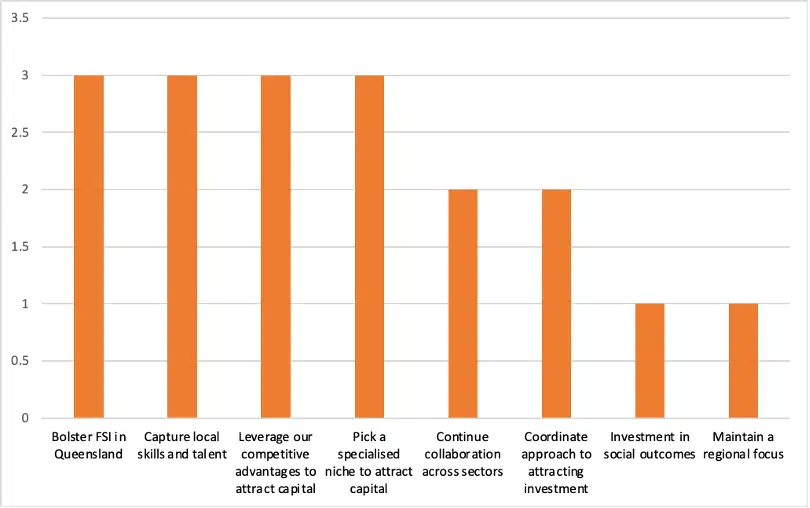 |
Chris Rogan
- Our panel session today will explore the significance of the financial services sector in Queensland in the national context and explore how the leading organisations in this sector are responding to challenges and preparing to take advantage of the opportunities in Queensland over the next decade.
- There is a great history of strong brands and organisations in Queensland which are represented by the excellent leaders on the panel here today. The sector is a strong driver of the State’s economic output and skills and career development. It is a large sector – the Queensland Treasury estimates the combined financial and professional services sector is approximately $42 billion in economic output and over 250,000 employees in FY20, and the ABS indicates the financial and insurance services sector contributed strongly to Queensland’s GSP growth in FY21.
|
|

|
Kylie Rampa
- There is tremendous opportunity in the Queensland market following the Covid pandemic. The economy has grown 10% compared to pre-pandemic, with 20% more jobs and sustained employment growth, driven by immigration, which it yet to peak. We’re still seeing opportunity emerge in the lead up to the Olympics which will continue to drive immigration and jobs growth. Immigration into State has seen a significant flow of 114,000 people per annum moving to Queensland.
- These strong fundamentals are really going to provide a strong backdrop to support significant growth in the economy and for the State over the next decade.
- There has also been a lot of reorganisation from in the funds management and financial services industry here in Queensland. For example, this includes the merger of QSuper and Sunsuper to create Australian Retirement Trust, which is the second largest superannuation fund in the country. We’ve also seen the merger of LGIASuper and Energy Super to create Brighter Super, reflecting continued growth more generally in the superannuation sector here in the State.
- The collaboration between organisations such as QIC and QTC and the superannuation industry are also creating a significant investment focus and greater investment opportunities in Queensland.
- The attraction of global talent is critical to the future of the State. The labour market has changed drastically compared to pre-pandemic; Queensland used to be blessed with a workforce who wanted to live and work here due to the State’s great liveability, but that is no longer the case – as people can live here but work for companies based elsewhere. Despite this, it can still be beneficial for the State because we’re able to retain a local workforce. This gives rise to us being able to recruit great talent into the market because they really like what Queensland has to offer – liveability, affordability and a great lifestyle. Queensland must continue to not only attract talent, but also retain it, rather than have a workforce which prefers to move to Sydney and Melbourne.
- Additionally, Queensland has a unique set of areas in which it has an international comparative advantage. These include renewable energy, electrification, rare earth minerals, carbon reduction, high tech manufacturing and natural capital. These all present a strong growth opportunity for the State and will attract further investment moving forward.
- The investment environment also benefits from collaboration between the business community and government. This has resulted in strong growth in attractive investment thematics. For example, QIC has managed funds in critical minerals and is supporting new industries through a venture capital development fund, a business investment fund and an enterprise acceleration fund to target different stages of business growth. Queensland is clearly seeing significant, high-quality private equity opportunity in these areas.
- QIC has also created the housing investment fund to drive investment and facilitate institutional investment into social housing, collaborating to develop an innovative structure between government, fund managers and a major capital partner. We have also created the Queensland Future Fund which is channelling further investment to benefit the State into the future.
- The clear challenges are around the very near-term pressures from high inflation and the impact of increasing interest rates. This will have a short-medium term impact and is increasing the required return on capital for investment, which does have a big impact on all of these initiatives, dampening risk appetite for capital investors and placing a real premium on liquidity as they navigate their own portfolio challenges.
- Queensland must continue to focus on social infrastructure, affordability and maintaining a high-quality lifestyle in the State because the stats show that by providing jobs goes alongside providing affordability and a compelling lifestyle – this is critical to the future economic success of the State.
- If we can keep up with global developments and remain ahead of the curve on significant global thematics, Queensland will be well positioned to attract capital, creating a strong investment thematic in the State, and driving diversification for the economy.
|
 |
Leon Allen
- Queensland’s opportunity will lie in creating a coherent direction in order to plan for and invest in the thematics that Kylie just spoke about.
- Queensland is a growth story. This extends beyond the huge investment going to energy, social services, economic infrastructure, and the Olympics; our growth story is driven by our economic dynamism around our attractiveness which draws people to the State and maintaining our position as a challenger brand across Australia.
- Within financial services, there is broad opportunity across banking, insurance, asset management, funds management and treasury services and through QTC’s borrowing and financial advisory in Queensland, we have seen strong capability and scale of businesses across the State, which should be leveraged to further support our growth story.
- Queensland is a lifestyle superpower. While there are challenges to managing growth, this lifestyle should be leveraged to drive our economy. This will help to further support the narrative around Queensland and could also be used to help drive innovation as a concept in order to position Queensland as a global innovation hotspot.
- We must also leverage our strong education sector to support the collaboration between industry and government to further support in creating a single, coherent voice to attract investment.
- These considerations will help to inform Queensland in creating a strategic vision, finding our comparative advantage as a finance sector, and indicating where we should lean in and invest.
|
 |
Shayne Elliott
- ANZ is 190 years old and employs about 50,000 people today. We’re in 32 markets around the world – meaning most of our people don’t live in Australia. The bank’s balance sheet is approaching $1tn dollars, with about $60 billion in shareholder capital.
- There is lots of opportunity to deploy capital and invest for growth. In considering these markets in our planning cycle for the year ahead, these markets will all provide ample ideas and opportunity. While Queensland also provides lots of opportunity, the State must carefully highlight how we can really capitalise on this opportunity above the rest.
- To achieve this will require understanding Queensland’s natural advantages to inform how we can maximise the opportunity and what next steps can be taken. To do this requires three considerations.
- The first is that capital flows where it is welcome – we must create a supportive environment which, for finance, requires technology and people. If the State can support these, it will attract investment. The second is that this requires a large, skilled talent pool which is not only generated within the State but can also be retained. The third is infrastructure and ensuring both digital and physical connectivity – enabling businesses to connect with the rest of the world. Together, these are the drawcards which maximise opportunity to attract capital.
|
 |
Steve Johnston
- Insurance is facing one of the biggest challenges in a generation – climate risk. The industry is dealing with the impacts of climate change, including the increasing frequency, length and severity of weather events. Suncorp has processed about half a million claims and spent billions of dollars to rebuild communities across the east coast of Australia over the past few years alone. Recently, New Zealand had two one-in-250-year events within two weeks, resulting in tens of thousands of claims worth billions of dollars in areas that weren’t previously considered high risk flood zones.
- This is resulting in a significant disruption in global reinsurance markets. Ten years ago, the reinsurance market looked towards Australia and New Zealand to diversify their risk, supporting their credit rating. This had been undertaken instead of focusing on primary and secondary perils, resulting in increasing risk and claims over the past decade. This has further resulted in a significant transfer of risk from reinsurers to primary insurers, some of which is ultimately being passed on to consumers.
- We must urgently address the challenge of climate change in a systemic and comprehensive way. Insurance will always be needed but it will become increasingly difficult for insurers to provide affordable insurance, particularly in areas where people have been allowed to build houses where they should never have been built. This presents a challenge throughout Queensland where flood risk is very high across many metropolitan and regional areas. Despite this, Suncorp will continue providing high quality underwriting, weather science, and undertake proactive work to understand the risks of climate change to ensure we continue to deliver highly sophisticated claims management processes.
|

|
Maryanne Kelly
- The finance and professional services sector is a significant contributor to the Queensland economy, with an estimated $42bn of economic output, and employment of over 250,000 people.
- Following Covid, Queensland’s economy and labour market are almost nation leading. This provides a solid platform to build economic opportunity and attract investment. State final demand growth is approximately 10.6% after Covid, above the nation’s average of 9.2%. We have seen the largest growth in the nation in employment with over 228,500 more people employed since before the pandemic. This has resulted in trend unemployment of 3.8% in March, which is amongst the lowest rates seen on record across the State. This includes regional statistics of 4.1% in Cairns, 3.38% in Central Queensland, 2.5% in Mackay and 2.2% in Townsville, which is a massive turnaround from a few years ago.
- This is supported by strong interstate migration, as well as international migration – which has seen a net increase of 42,000 people in the first three quarters of 2022.
- Queensland’s trade is also incredibly strong – with overseas goods exports increasing almost 50% in the last 12 months to February to about $135.8bn.
- We’ve seen these strong numbers despite the challenges posed by rising interest rates. In fact, taking these figures together, we have seen the strongest business conditions of all states. These metrics will continue to improve, highlighting Queensland’s strength as a great place for businesses to invest.
- The International Monetary Fund’s latest outlook has the global economy growing at 2.8% in 2023 and 3% in 2024. This is a downgrade since the January outlook, reflecting a heavy skew to the downside risks.
- While our economy is strong, we are not immune to these global challenges, which extend across the supply chain, skills and labour market, and inflation and cost increases.
- Queensland Government is responding to these challenges by maintaining a strong dialogue with industry to understand what we need to do to ensure the economy continues to grow. This includes prioritising major projects.
|
 |
Peter Lock
- The recent merger of Heritage and People’s Choice has made it the 10th largest domestic bank, with a 150-year history and origin in Toowoomba.
- Queensland has an opportunity to be a challenger State, providing opportunity and natural advantage in financial services for the State to challenge Melbourne and Sydney as Australia’s financial centres. We are the home of Suncorp and Bank of Queensland, insurance companies like Youi, superannuation and mutuals like Heritage and People’s Choice and Great Southern.
- A unique characteristic of Queensland is its broad geography, providing the ability and strength to provide a regional focus. This is true for Heritage and People’s Choice, being headquartered in Toowoomba. This is one example of investment in regional communities that creates white collar jobs and supports the broader regional community. Because the financial services sector has a responsibility to service the needs of the whole State, having this focus allows for better outcomes in regional communities and supports investment in this unique strength of Queensland.
|



































